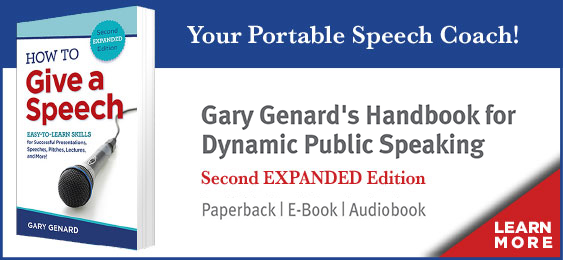Have you heard that a rhetorical question is a great way to get your audience’s attention? Well, it is. So is a question that you actually expect an answer to. In both cases, speaking directly to your listeners can simply be more magical than throwing information and data their way. (For more ways to develop rapport with listeners, download my free cheat sheet, "5 Ways to Captivate an Audience.")
The reason is simple: listeners respond mentally to questions, whether they think a vocalized answer is expected or not. And anything that engages your audience and gets them thinking will increase your public speaking success.
Don’t you agree?
(You'll notice, of course, that I just did what I'm suggesting above.)
Are You Letting Your Audience Be Passive?
Questions are speech tools that are custom-made for bridging the gap between audience passivity and a speaker’s need to actively engage his or her listeners. The problem is that audiences are conditioned to be passive recipients of information—to sit quietly while information washes over them. As the Eagles song “Hotel California” says: they are programmed to receive.
But people learn poorly in the passive mode. They retain much more from a speech or presentation when they are active participants in the learning process. An endless procession of PowerPoint slides, for instance, is far more coma-inducing than enlightening. Here are 12 foolproof ways to open a speech or presentation to get off to a strong start.
Why Asking Questions Engages Listeners
Questions bring listeners back from this netherworld. Remember the times when you were daydreaming in class and you suddenly heard your name called to answer a question? That focused your mind in an instant, didn’t it?
Rhetorical or not, questions invite your audience to reacquaint themselves with you, your topic, and your presentation. But there’s no need to wait for make-or-break responses to your major points, or to arm yourself only for Q & A. Even in a 30-minute presentation, there will be dozens of times when you can “ask small questions” to re-engage your audience.
Here are some common examples of ways for you to "check in" with your listeners. These questions—minor on the surface—can alert you to how your audience is responding to your message, to whether they're paying attention, and whether you've lost them somewhere in the last few minutes. Equally important, they remind listeners that you and they are in this together, that your presentation (like all good speeches) is a dialogue between you and them, not a monologue.
After all, speeches and presentations exist for the benefit of the audience, not the speaker. A one-way talk in which the presenter is more interested in blasting out information than in achieving true influence, is a speech that isolates both speaker and listeners. Here's a way to give an audience a greeting they'll remember. And here are 10 ways to stay fully focused in your presentation to keep the influence flowing.
So use the following small questions whenever you feel a checking-in moment is necessary. These questions work whatever your subject matter or even your approach:
“Isn’t that so?”’
“Haven’t you found that to be the case?”
“You know what I’m talking about, don’t you?”
“Yes?”
“Yes or no?”
“We’ve all experienced that, haven’t we?”
“Right?”
“Everybody with me so far?”
Any questions?
Key takeaways from this blog:
- Questions allow you to speak directly to listeners, which can be powerful.
- Listeners will respond mentally to questions even if they are rhetorical.
- Audiences can easily become passive, so use questions to re-engage them.
- When you ask questions, you can "check in" that listeners are still with you.
- To truly influence audiences, you need to reach out to them in many ways.



